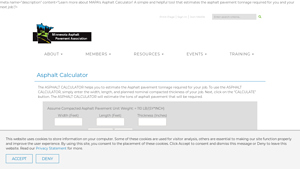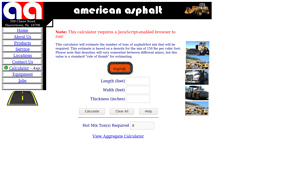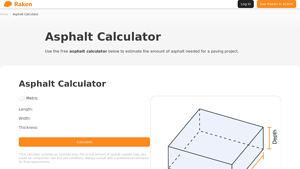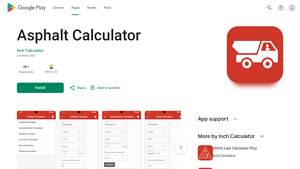Free Asphalt Calculators: Our Top 5 Picks for 2025
Finding the Best Asphalt Calculator: An Introduction
When it comes to planning paving projects, accurately estimating the amount of asphalt required can be a daunting task. With various factors to consider—such as area dimensions, asphalt thickness, and specific material densities—the need for a reliable asphalt calculator becomes paramount. However, not all calculators are created equal; some may provide inaccurate estimates or lack user-friendly interfaces, leading to frustration and potential project delays.
This article aims to simplify your search for the best asphalt calculator by reviewing and ranking the top online tools available. Our goal is to save you time and effort by presenting a curated list of calculators that meet a range of needs, whether you’re a DIY enthusiast tackling a small driveway or a contractor managing a large commercial project.
Criteria for Ranking
To ensure our recommendations are both relevant and practical, we evaluated each calculator based on several key criteria:
- Accuracy: We looked for calculators that use industry-standard formulas and reliable density values to provide precise estimates.
- Ease of Use: User-friendly designs and straightforward input methods were prioritized, allowing users to quickly and efficiently obtain their results.
- Features: Additional functionalities, such as the ability to adjust for compaction rates or include various asphalt types, were considered to enhance usability.
- Accessibility: We focused on calculators that are easily accessible online without the need for downloads or complicated setups.
By focusing on these criteria, we aim to guide you toward the most effective tools for your asphalt estimating needs, ensuring you can approach your paving projects with confidence and clarity.
Our Criteria: How We Selected the Top Tools
Selection Criteria for Asphalt Calculators
When evaluating the best online asphalt calculators, we considered several key criteria to ensure that users can find reliable, user-friendly tools suited for their specific needs. Below are the primary factors that guided our selection process:
-
Accuracy and Reliability
– The most critical aspect of any calculator is its ability to provide accurate estimates. We focused on tools that utilize standardized formulas for asphalt calculations, taking into account the weight of compacted asphalt and other relevant factors. Each calculator should clearly state the assumptions made regarding material density to avoid confusion. -
Ease of Use
– A user-friendly interface is essential for both professionals and DIY enthusiasts. We prioritized calculators that require minimal input and feature intuitive designs. The ability to quickly enter dimensions (length, width, and thickness) and receive instant results without complex navigation enhances user experience. -
Key Features
– Effective asphalt calculators should offer specific inputs relevant to asphalt projects. We looked for tools that allow users to input:- Length (in feet)
- Width (in feet)
- Thickness (in inches)
- Additionally, calculators that provide options for adjusting asphalt density or compaction rates were favored, as these factors can significantly influence the final estimate.
-
Cost (Free vs. Paid)
– The availability of free calculators was a significant consideration. Many users prefer tools that do not require any payment or subscription. We included both free and paid options but ensured that the free calculators provided sufficient functionality for most typical projects. -
Additional Resources and Support
– We assessed whether the calculators were accompanied by educational resources, such as guides or FAQs, that help users understand how to use the calculator effectively. Tools that explain the asphalt installation process or provide insights on material types and their applications were given preference. -
Compatibility and Accessibility
– The calculators should be accessible across various devices, including smartphones, tablets, and desktops. We favored tools that do not require specific browsers or software, ensuring that they can be used seamlessly by anyone, anywhere. -
User Feedback and Reviews
– We considered user ratings and testimonials to gauge the effectiveness and reliability of each calculator. Tools with positive feedback from a broad user base were prioritized, as they reflect real-world performance and user satisfaction.
By applying these criteria, we aimed to compile a list of asphalt calculators that cater to a diverse audience, ensuring that both novices and experienced professionals can find a suitable tool for their asphalt project needs.
The Best Asphalt Calculators of 2025
1. Asphalt Calculator
The Asphalt Calculator from the Minnesota Asphalt Pavement Association is a user-friendly tool designed to help users estimate the amount of asphalt needed for their projects. By entering the width, length, and desired nominal compacted thickness, users can easily obtain accurate calculations with just a click of the “CALCULATE” button. This efficient tool streamlines the planning process for paving projects, ensuring precise measurements for optimal results.
- Website: asphaltisbest.com
- Established: Approx. 23 years (domain registered in 2002)
3. American Asphalt Paving Co
The American Asphalt Paving Co Calculator is a practical tool designed to estimate the quantity of asphalt or hot mix needed for paving projects. By utilizing a standard density of 150 lbs per cubic foot, the calculator provides users with accurate tonnage estimates, making it easier to plan and budget for asphalt requirements. This tool is particularly useful for contractors and DIY enthusiasts looking to streamline their paving operations.
- Website: amerasphalt.com
- Established: Approx. 23 years (domain registered in 2002)
4. Asphalt Calculator
The Asphalt Calculator by Raken is a free online tool designed to help users estimate the amount of asphalt required for various paving projects. Its user-friendly interface allows for quick calculations, making it an essential resource for contractors and DIY enthusiasts alike. By inputting project dimensions, users can efficiently determine the necessary asphalt quantity, ensuring accurate budgeting and material planning for successful paving outcomes.
- Website: rakenapp.com
- Established: Approx. 12 years (domain registered in 2013)
5. Asphalt Calculator
The Asphalt Calculator app is a free tool designed for Android users to accurately estimate the quantities of hot mix, base material, and sealcoat required for various paving projects, including driveways and blacktop. With a user-friendly interface, it allows users to input dimensions in inches or feet, making it accessible for both DIY enthusiasts and professionals. Despite a moderate rating of 3.8 from 15 reviews, its practical features can assist in project planning and material cost estimation.
- Website: play.google.com
- Established: Approx. 28 years (domain registered in 1997)
How to Get the Most Accurate Results
Double-Check Your Inputs
One of the most crucial steps in using an asphalt calculator is to ensure that your inputs are accurate. Measure the length, width, and thickness of the area you plan to pave with a tape measure or laser measuring tool. It’s essential to enter these measurements in the correct units (feet or inches) as specified by the calculator. For instance, if you need to enter the thickness in inches, avoid using fractions; instead, convert them to decimal values. Taking the time to verify your measurements before inputting them can significantly impact the accuracy of the results.
Understand the Underlying Assumptions
Each asphalt calculator operates based on certain assumptions regarding material density and compaction rates. For example, many calculators assume a standard density of asphalt to be around 150 lbs per cubic foot or 110 lbs per square yard per inch of thickness. However, the actual density can vary depending on the specific asphalt mix used and environmental factors. Familiarize yourself with these assumptions to better understand how they might affect your calculations. If possible, consult with a local contractor or supplier to obtain more precise density values for your specific project.
Use Multiple Tools for Comparison
Relying on a single calculator may not provide the most accurate estimate for your asphalt needs. Different tools can have varying methodologies and assumptions, leading to different results. It is advisable to use multiple calculators and compare their outputs. This practice not only helps you identify any discrepancies but also allows you to get a more rounded understanding of the materials required for your project. Note the differences in the results and consider the average or the most reasonable estimate based on your project specifics.
Factor in Site Conditions
The conditions of the site where you plan to lay the asphalt can greatly influence the amount of material you’ll need. If the area is uneven, damaged, or has a subgrade that requires additional preparation, you may need more asphalt than a standard calculation suggests. Consider factors like the current state of the surface and any additional layers that might be required for stability or drainage. Consulting with a professional can provide insights into these conditions and help you adjust your estimates accordingly.
Consult a Professional
Finally, while asphalt calculators can provide a useful estimate, they should not be considered definitive. It’s always a good idea to consult with a professional contractor who can provide tailored advice based on your project requirements. An expert can assess the site conditions, recommend the appropriate asphalt type, and ensure that all factors are considered for a successful paving job. Their experience can also help you avoid common pitfalls and ensure the longevity of your asphalt installation.
Frequently Asked Questions (FAQs)
1. What is an asphalt calculator and how does it work?
An asphalt calculator is an online tool that estimates the amount of asphalt needed for a specific paving project. To use it, you typically input the dimensions of the area you plan to pave—specifically the length, width, and desired thickness of the asphalt layer. The calculator then computes the total asphalt tonnage required, often using standard density values for asphalt, which can vary based on the specific type of asphalt mix used.
2. What information do I need to use an asphalt calculator?
To effectively use an asphalt calculator, you will need the following information:
– Length of the area (in feet)
– Width of the area (in feet)
– Thickness of the asphalt layer (in inches)
It’s important to ensure that your measurements are accurate, as this will directly impact the accuracy of the asphalt estimate.
3. Are the estimates provided by asphalt calculators accurate?
Asphalt calculators provide estimates based on standard formulas and average material densities. While they can give a good approximation of the required asphalt, actual needs may vary depending on factors such as compaction rates, sub-grade conditions, and specific asphalt mix densities. For precise requirements, it is advisable to consult with a professional contractor who can assess the site conditions.
4. Can I use an asphalt calculator for different types of asphalt?
Yes, most asphalt calculators can be used for various types of asphalt, including hot mix, warm mix, and cold mix asphalt. However, the density values may differ between these types, so it’s essential to either use the calculator’s default settings or input specific densities if you have that information. This will help ensure a more accurate estimate based on the particular asphalt mix you plan to use.
5. How do I interpret the results from an asphalt calculator?
The results from an asphalt calculator typically show the total amount of asphalt needed in tons. To interpret these results:
– Review the total tonnage: This indicates how much asphalt you will need to purchase.
– Consider site conditions: Factors like existing surface conditions and compaction may necessitate adjustments to this figure.
– Consult professionals: If you have questions about the results or how they apply to your specific project, it’s best to consult with a paving contractor who can offer tailored advice based on your unique situation.
Important Disclaimer
⚠️ Important Disclaimer
The information and reviews in this guide are for educational purposes only and are based on publicly available information. We are not affiliated with any of the tools mentioned. Features and pricing may change. Always conduct your own research before choosing a tool for your needs.





